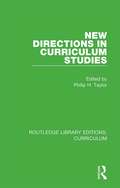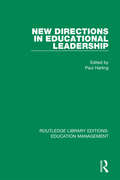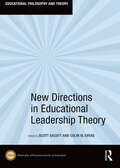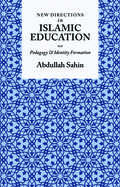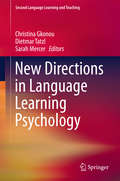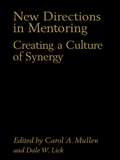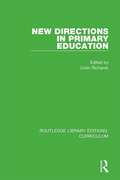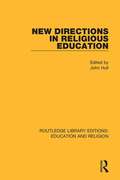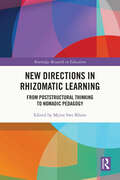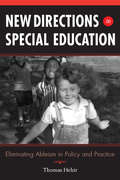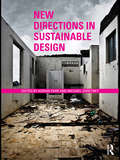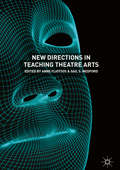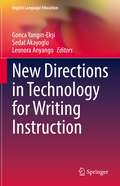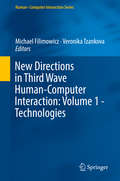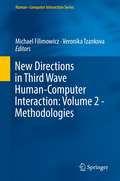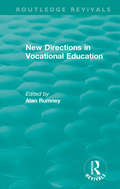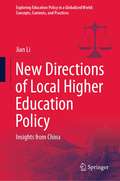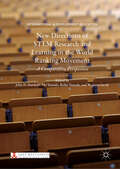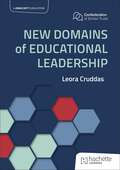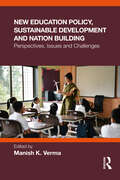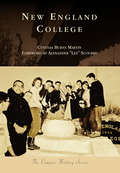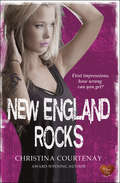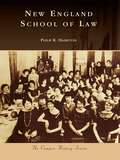- Table View
- List View
New Directions in Curriculum Studies (Routledge Library Editions: Curriculum #33)
by Philip H. TaylorOriginally published in 1979. Celebrating the tenth anniversary of the Journal of Curriculum Studies. This edited collection of ten significant papers, five of them specially commissioned to critically survey a decade of intellectual effort in selected areas of curriculum studies, not only identifies the emerging frontiers in an important field within the study of education but also provides an excellent set of teaching and learning resources in an area where the usual text book can be counter-productive.
New Directions in Educational Leadership (Routledge Library Editions: Education Management)
by Paul HarlingOriginally published in 1984. The argument of this book is that the preceding 12 to 15 years saw significant changes in educationalists’ understanding and application of the concepts of leadership, and because of these changes two things happened. One, the relationship between participants changed; and two, policy and practice also changed. The papers in this collection have been specially commissioned or collected together with this thesis in mind. Each of them examines leadership with special reference to one or more aspects, sectors, roles or interests within the educational system of England and Wales.
New Directions in Educational Leadership Theory (ISSN)
by Scott Eacott and Colin W. EversEducational leadership has a rich history of epistemological debate. From the ‘Theory Movement’ of the 1950-1960s, through to Greenfield’s critique of logical empiricism in the 1970s, the emergence of Bates’ and Foster’s Critical Theory of educational administration in the 1980s, and Evers’ and Lakomski’s naturalistic coherentism from1990 to the present time, debates about ways of knowing, doing, and being in the social world have been central to advancing scholarship. However, since the publication of Evers’ and Lakomski’s work, questions of the epistemological preliminaries of research have become somewhat marginalised. This is not to suggest that such discussions are not taking place, but rather that they have been sporadic and piecemeal. In New Directions in Educational Leadership Theory, the contributors sketch possible alternatives for advancing scholarship in educational leadership. The coherence of this volume comes not from the adoption of a single theoretical lens, but rather from its engagement with epistemology, ontology, and methodology. The choice of the plural ‘alternatives’ is deliberate, and its use is to evoke the message that there is more than one way to advance knowledge. The approaches adopted across this collection offer fruitful directions for the field and hopefully will stimulate substantive dialogue and debate in the interest of advancing knowledge. This book was originally published as a special issue of Educational Philosophy and Theory.
New Directions in Islamic Education
by Abdullah Sahin"This ground-breaking book is one of the most significant contributions made in recent years to Islamic education."-John M. Hull, University of Birmingham, United KingdomNew Directions in Islamic Education is a radical rethinking of Islamic education in the modern world. It explores the relationship between pedagogy and the formation of religious identities within Islamic education settings that are based in minority and majority Muslim contexts.Dr. Abdullah Sahin directs the Centre for Muslim Educational Thought and Practice and is the course leader for the MEd program in Islamic Education at MIHE in Leicestershire, United Kingdom.
New Directions in Language Learning Psychology
by Sarah Mercer Christina Gkonou Dietmar TatzlThis book explores potential new directions in the growing field of language learning psychology. The individual chapters cover theoretical and conceptual developments and innovative methodological designs, while also exploring practical implications. Language learning psychology is a vibrant field of research that typically involves constructs from social and educational psychology, which it considers in terms of their relevance for the domain of language learning. The diverse theoretical and empirical chapters examine a range of familiar and lesser-known constructs, highlighting the importance of taking into account both learner and teacher psychologies, and recognising the complexity, dynamism and situatedness of psychological constructs, as well as the value of employing diverse research methodologies. It is hoped that these 'new directions' concerning populations, constructs and theoretical and methodological frameworks will pave the way for innovative future developments in this vibrant field.
New Directions in Mentoring: Creating a Culture of Synergy
by Carol A. Mullen Dale W. LickThis collection is the result of action research carried out by teachers, administrators and professors operating a school-university collaboration. It creates a model of mentoring where guided but flexible structures are used to unleash the creative capacity of the group. The research accounts reveal much about the nature of mentoring organizations, as they are now and how they might be improved. Approaches include the use of lifelong mentoring, synergistic co-mentoring, professional peer networking and the creation of collaborative relationships and teams.
New Directions in Primary Education (Routledge Library Editions: Curriculum #28)
by Colin RichardsOriginally published in 1982. This book analyses developments in primary education since 1974 and from this analysis draws out issues gaining rapidly in currency and seem likely to have significant impact on primary education in the following decade. As well as including a substantial number of papers written specially for the book, it draws on some of the best of writing on primary education at the time. This is extremely useful for those interested in curriculum history.
New Directions in Religious Education (Routledge Library Editions: Education and Religion #7)
by John HullFirst published in 1982. This book brings together some of the most influential articles which had moulded British religious education. The articles are divided into specialised sections dealing with various aspects of the subject so that the main developments are clearly indicated. The first section of the book deals with research into the religious psychology of childhood. This is followed by two collections of articles dealing with the search for a philosophy of religious education and with the problems created for the teaching of religion in Britain by our pluralist society. The fourth section deals with the problems of designing a curriculum in religious education, while the final part gives some examples of methods in the teaching of religion. The book thus provides, both the general reader, the student teacher and the specialist religious education teacher, an easily accessible collection of many of the materials which had created British religious education.
New Directions in Rhizomatic Learning: From Poststructural Thinking to Nomadic Pedagogy (Routledge Research in Education)
by Myint Swe KhineDrawing on the theories and philosophies of Deleuze and Guattari, this edited collection explores the concept of rhizomatic learning and consolidates recent explorations in theory building and multidisciplinary research to identify new directions in the field. Knowledge transfer is no longer a fixed process. Rhizomatic learning posits that learning is a continuous, dynamic process, making connections, using multiple paths, without beginnings, and ending in a nomadic style. The chapters in this book examine these notions and how they intersect with a contemporary and future global society. Tracking the development of the field from postructuralist thinking to nomadic pedagogy, this book goes beyond philosophy to examine rhizomatic learning within the real world of education. It highlights innovative methods, frameworks, and controversies, as well as creative and unique approaches to both the theory and practice of rhizomatic learning. Bringing together international contributors to provide new insights into pedagogy for 21st-century learning, this book will be of interest to academics, researchers, and postgraduate students in education and adjacent fields.
New Directions in Special Education: Eliminating Ableism in Policy and Practice
by Thomas HehirA comprehensive study that is also practical and realistic, New Directions in Special Education outlines principles for decisionmaking about special education at every level--from the family to the classroom, school, and district--and for state and federal policy. With this volume, leading scholar and disability advocate Thomas Hehir opens a new round of debate on the future of special education. Extending the conceptual framework developed in his seminal 2002 article in the Harvard Educational Review, "Eliminating Ableism in Education," Hehir examines the ways that cultural attitudes about disability systematically distort the education of children with special needs and uses this analysis to lay out a fresh approach to special education policy and practice. Hehir traces the roots of "ableism"--the pervasive devaluation of people with disabilities--and shows how negative attitudes continue to shape debates in the field. He assesses recent trends in special education policy, particularly the shift of emphasis from compliance to outcomes, and discusses in depth the successes and limitations of the inclusion movement. He also investigates the impact of standards-based reforms on children with disabilities and critically examines the promise of Universal Design for Learning.
New Directions in Special Education: Eliminating Ableism in Policy and Practice
by Thomas HehirA comprehensive study that is also practical and realistic, New Directions in Special Education outlines principles for decisionmaking about special education at every level—from the family to the classroom, school, and district—and for state and federal policy. With this volume, leading scholar and disability advocate Thomas Hehir opens a new round of debate on the future of special education. Extending the conceptual framework developed in his seminal 2002 article in the Harvard Educational Review, "Eliminating Ableism in Education," Hehir examines the ways that cultural attitudes about disability systematically distort the education of children with special needs and uses this analysis to lay out a fresh approach to special education policy and practice. Hehir traces the roots of "ableism"—the pervasive devaluation of people with disabilities—and shows how negative attitudes continue to shape debates in the field. He assesses recent trends in special education policy, particularly the shift of emphasis from compliance to outcomes, and discusses in depth the successes and limitations of the inclusion movement. He also investigates the impact of standards-based reforms on children with disabilities and critically examines the promise of Universal Design for Learning.
New Directions in Sustainable Design
by Adrian Parr Michael ZaretskyRecently there has been a plethora of work published on the topic of sustainability, much of which is purely theoretical or technical in its approach. More often than not these books fail to introduce readers to the larger challenge of what thinking sustainably might entail. Combining a series of well know authors in contemporary philosophy with established practitioners of sustainable design, this book develops a coherent theoretical framework for how theories of sustainability might engage with the growing practice of design. This book: brings together new and emerging perspectives on sustainability provides cohesive and jargon-free reading articulates the specificity of both theory and practice, to develop a symbiotic relationship which allows the reader to understand what thinking sustainably entails This volume describes a variety of new ways to approach sustainable design and it equips the next generation of designers with necessary conceptual tools for thinking sustainably.
New Directions in Teaching Theatre Arts
by Anne Fliotsos Gail S. MedfordThis book reflects the changes in technology and educational trends (cross-disciplinary learning, entrepreneurship, first-year learning programs, critical writing requirements, course assessment, among others) that have pushed theatre educators to innovate, question, and experiment with new teaching strategies. The text focuses upon a firm practice-based approach that also reflects research in the field, offering innovative and proven methods that theatre educators may use to actively engage students and encourage student success. The sixteen essays in this volume are divided into five sections: Teaching with Digital Technology, Teaching in Response to Educational Trends, Teaching New Directions in Performance, Teaching Beyond the Traditional, and Teaching Collaboratively or Across Disciplines. Study of this book will provoke readers to question both teaching methods and curricula as they consider the ever-shifting arts landscape and the potential careers for theatre graduates.
New Directions in Technology for Writing Instruction (English Language Education #30)
by Gonca Yangın-Ekşi Sedat Akayoglu Leonora AnyangoThis book responds to the changes and needs of English Language Learning by offering insight into online writing pedagogical platforms and atmospheres. Language learning enriched with technology, web tools and applications have become a necessary ingredient in language education internationally. This volume provides an in-depth understanding of writing practices that are responsive to the challenges for teaching and learning writing in local and global contexts of education. It also provides succinct knowledge at the intersection of technology with teaching, learning, and research. The chapters herein creatively take advantage of the affordances of digital platforms and further critiques their limitations. The book also delineates knowledge on concepts, theories, and innovative approaches to digital writing in the field of teaching and learning English. The chapters focus on reviews and provide guidance on the practical use of Web 2.0 and multimedia tools as well as presenting research on technology integration in writing classes.
New Directions in Third Wave Human-Computer Interaction: Volume 1 - Technologies (Human–Computer Interaction Series)
by Michael Filimowicz Veronika TzankovaAs the first extensive exploration of contemporary third wave HCI, this handbook covers key developments at the leading edge of human-computer interactions. Now in its second decade as a major current of HCI research, the third wave integrates insights from the humanities and social sciences to emphasize human dimensions beyond workplace efficiency or cognitive capacities. The earliest HCI work was strongly based on the concept of human-machine coupling, which expanded to workplace collaboration as computers came into mainstream professional use. Today HCI can connect to almost any human experience because there are new applications for every aspect of daily life. Volume 1 - Technologies covers technical application areas related to artificial intelligence, metacreation, machine learning, perceptual computing, 3D printing, critical making, physical computing, the internet of things, accessibility, sonification, natural language processing, multimodal display, and virtual reality.
New Directions in Third Wave Human-Computer Interaction: Volume 2 - Methodologies (Human–Computer Interaction Series)
by Michael Filimowicz Veronika TzankovaThis is the first extensive compilation documenting contemporary third wave HCI, covering key methodological developments at the leading edge of human-computer interactions. Now in its second decade as a major current of HCI research, the third wave integrates insights from the humanities and social sciences to emphasize human dimensions beyond workplace efficiency or cognitive capacities. Where the earliest HCI work has been strongly based on the concept of human-machine coupling, which expanded to workplace collaboration as computers came into mainstream professional use, today HCI can connect to almost any human experience because there are new applications for every aspect of daily life.Volume 2 - Methodologies covers methodological approaches grounded in autoethnography, empathy-based design, crowdsourcing, psychometrics, user engagement, speculative design, somatics, embodied cognition, peripheral practices and transdisciplinarity.
New Directions in Vocational Education (Routledge Revivals)
by Alan RumneyOriginally published in 1989, it was thought that one effective way out of the unemployment problem facing many young people in Britain at the time was to ensure that vocational courses in further education had a close ‘fit’ with the needs of industry and commerce. People involved in further education were therefore making tremendous efforts to develop appropriate forms of learning and assessment and to achieve effective communication between college and employers. The contributors to this book provide a clear assessment of directions in further education and an overview of the key changes and developments taking place at the time. Many of the changes and developments discussed profoundly altered the nature and structure of educational provision for the 16-19 age-group and mature students returning to learning. Topics explored are some of the more important issues challenging FE at the time: facilitating learning; assessment and profiling; course evaluation; the Open Colleges movement; the Review of Vocational Qualifications; ethnic minorities and FE provision; open learning strategies. Each chapter is written by an experienced teacher actively involved in formulating and putting into practice many of the new ideas being developed within further education at the time. The book will still be of interest to people working in further education, adult education and continuing education.
New Directions of Local Higher Education Policy: Insights from China (Exploring Education Policy in a Globalized World: Concepts, Contexts, and Practices)
by Jian LiThis book examines the directions of local higher education policy in contemporary China since reform and opening up. It involves investigating rationales and conceptualizing analytical framework of shaping multiple type-based local higher education system, including the local undergraduate universities, skill-based local colleges, and technical-oriented local higher education institutions. This book offers an in-depth understanding of problems and strategies in regard to addressing complicated development of local higher education institutions in recent decades in China. In addition, this book also involves exploring local undergraduate universities in China, the current mechanism of local universities from the perspective of organizational transformation, the emergence of application and skill-based local colleges and universities in China, the vocational education development in China as one major type of local universities, the local technical universities’ development in China from multiple perspectives, and the professional groups in local vocational colleges.
New Directions of STEM Research and Learning in the World Ranking Movement: A Comparative Perspective (International and Development Education)
by Reiko Yamada W. James Jacob John N. Hawkins Aki YamadaThis volume analyzes the dominance of STEM fields in various university rankings and the reasons why many governments in the world disproportionately give value to STEM fields. Secondly, although there is general agreement that STEM fields are important, chapter authors also examine the role of interdisciplinary and multidisciplinary approaches for a revised STEM education as well as implications for the future. The book presents examples from the United States, Canada, Japan, Korea, and Taiwan.
New Domains of Educational Leadership
by Leora CruddasOver the past two decades, school trusts have assumed an increasingly significant role as education providers. This book is about leadership, written from the perspective of the founding chief executive of the Confederation of School Trusts, which advocates for, connects and supports trusts in the English education sector.In his foreword to this book, Sir Hamid Patel writes: 'The skills required of trust leadership are complex and multi-faceted. In this comprehensive study, three domains are given close consideration: organizational leadership, civic leadership and system leadership. If we are to maximize our opportunities and powers as trust leaders, we must attend closely to all three elements, securing our foundations and extending our influence'.
New Domains of Educational Leadership
by Leora CruddasOver the past two decades, school trusts have assumed an increasingly significant role as education providers. This book is about leadership, written from the perspective of the founding chief executive of the Confederation of School Trusts, which advocates for, connects and supports trusts in the English education sector.In his foreword to this book, Sir Hamid Patel writes: 'The skills required of trust leadership are complex and multi-faceted. In this comprehensive study, three domains are given close consideration: organizational leadership, civic leadership and system leadership. If we are to maximize our opportunities and powers as trust leaders, we must attend closely to all three elements, securing our foundations and extending our influence'.
New Education Policy, Sustainable Development and Nation Building: Perspectives, Issues and Challenges
by Manish K. VermaThe book provides a comprehensive account of the linkages between education, sustainable development, and nation-building from an interdisciplinary perspective. It examines various theories of education and sustainable development and critically explores the origin, evolution, and contours of education in India through the lens of the current policy debates around the Indian educational system. The book also investigates to what extent the New Educational Policy deliberations can be instrumental for the nation’s development, as well as be an effective tool for devising sustainable solutions, including the new challenges posed by climate change.An important blueprint of higher education policy and planning, the book will be indispensable for teachers, students, and researchers of education, public policy, educational studies, development studies, sustainable development, sociology, history, and political studies. It will also be of immense interest to policymakers, development practitioners, and NGOs.
New England College (Campus History)
by Cynthia Burns Martin Alexander Lex" ScourbyThroughout its history, New England College has been recognized for innovative academic programs and leadership in experiential education. Founded in 1946 to offer educational opportunities to veterans eager to return to the workforce, the college pioneered an accelerated and demanding three-year degree program, unique at that time. From the earliest years to the present day, the faculty has included practitioners active in their fields and fostered learning partnerships with external organizations. In 1971, the college acquired a British campus and became one of the first American institutions to offer students a full four-year degree program outside of the United States, an innovation in cross-cultural experiential education. In recent years, the college has effectively utilized technological advancements to extend the reach of its creative and supportive learning community, while still challenging individuals to transform themselves and their world, maintaining a curriculum focused on experiential learning, and fostering collaborative relationships among members of the community.
New England Rocks
by Christina CourtenayA high-born British boarding-school girl is exiled to America—and meets a hunky punk rocker who turns her world upside down . . . When wealthy Rain Mackenzie is expelled from her elite British boarding school, she’s forced to join her parents in Massachusetts and attend a lowly public high school as punishment. Determined to escape, Rain makes it her mission to hate everything—and everybody—about Northbrooke High. But that mission becomes impossible when she meets sexy punk rocker Jesse Devlin. Jesse has spikey hair, a pierced eyebrow, and an awesome rock band. Unfortunately, he also has a girlfriend. As the most popular guy in school, it’s only natural that Jesse dates the most popular girl. But something just feels right about Rain. And besides, she has an accent like James Bond’s, only sexier. In this story of transatlantic teen romance, “Courtenay crafts a spectacular, fun-filled book” (RT Book Reviews).
New England School of Law
by Philip K. HamiltonIn December 1908, 12 years before the 19th Amendment gave women the right to vote, Arthur Winfield MacLean, an entrepreneurial Boston attorney, resolved to train women to be lawyers. What began with just two students grew each year until 1918, when he incorporated his enterprise as Portia School of Law, the only law school in the country founded exclusively for women. By 1927, the law school had 436 students and regularly provided the majority of female admittees to the Massachusetts bar. Guided by Dean MacLean and his successors, Portia began admitting men in 1938 and in 1969 achieved national accreditation as New England School of Law. In 1998, it was admitted to the Association of American Law Schools. Throughout its history, New England School of Law has maintained a tradition of offering opportunity and motivating its students to transcend barriers. Today that tradition is carried on by an outstanding faculty backed by committed administrators and trustees.
